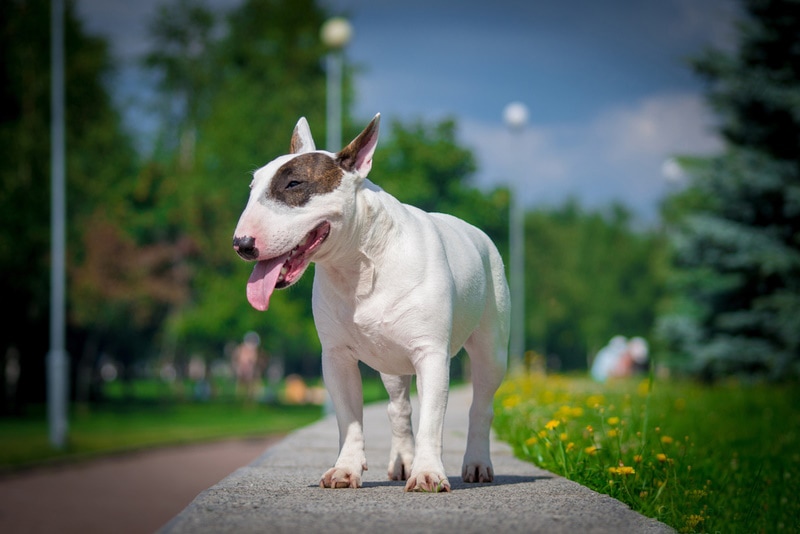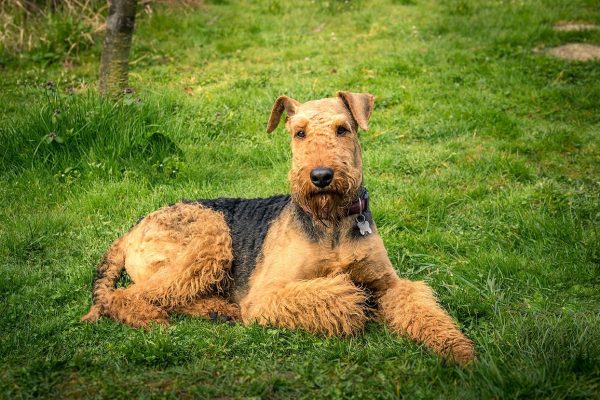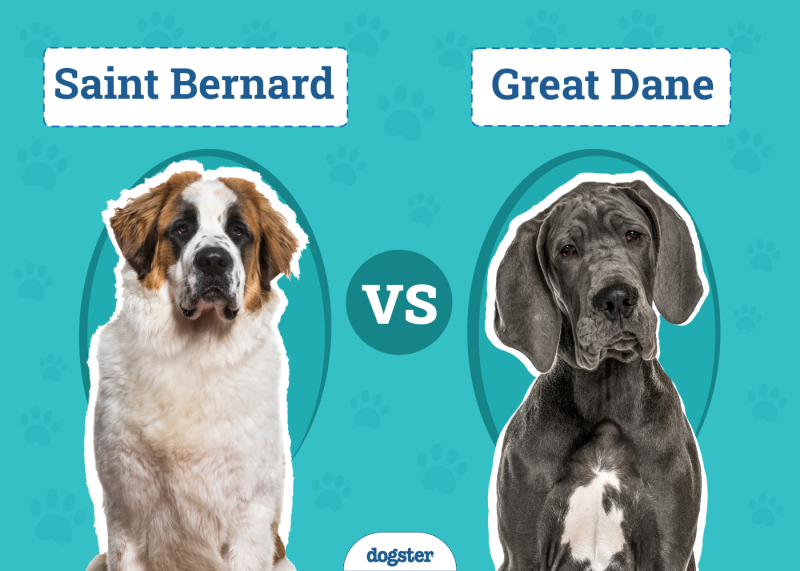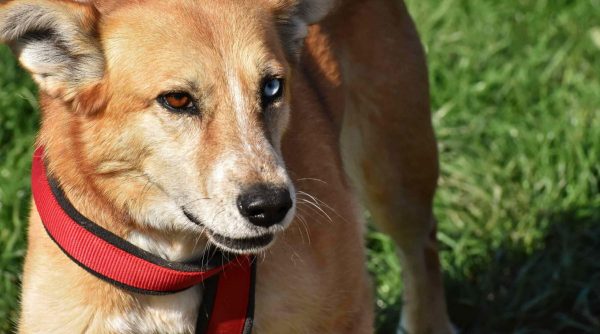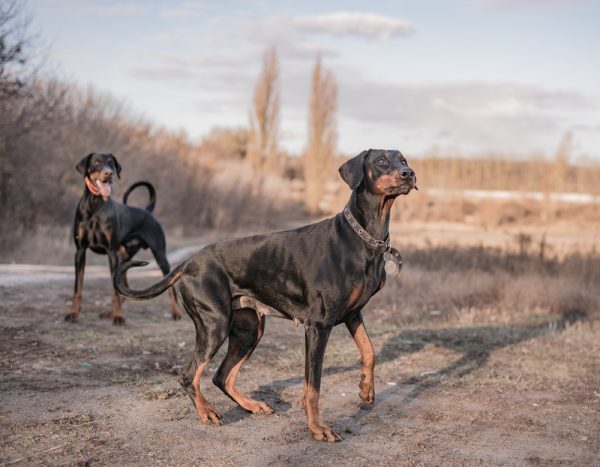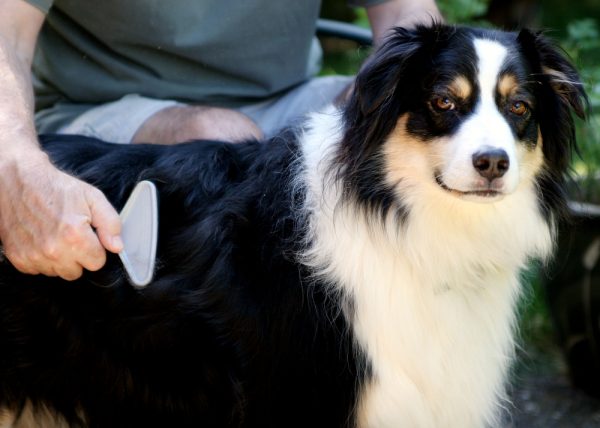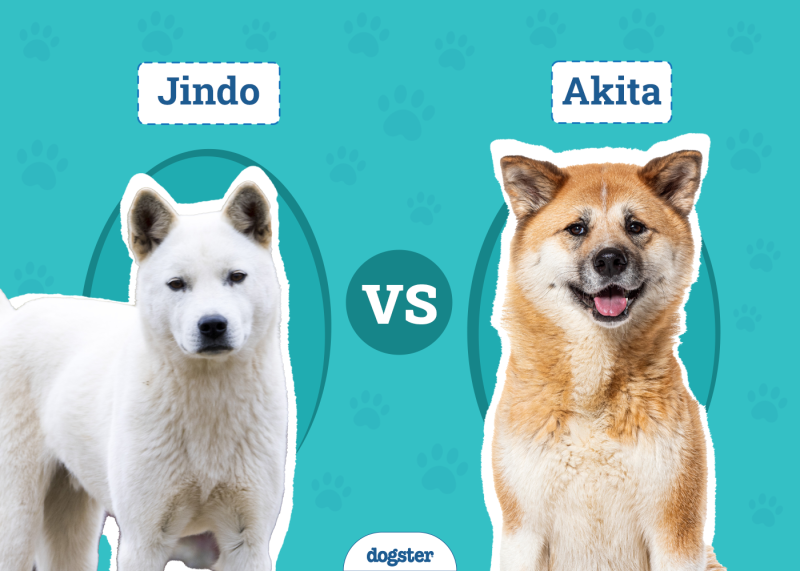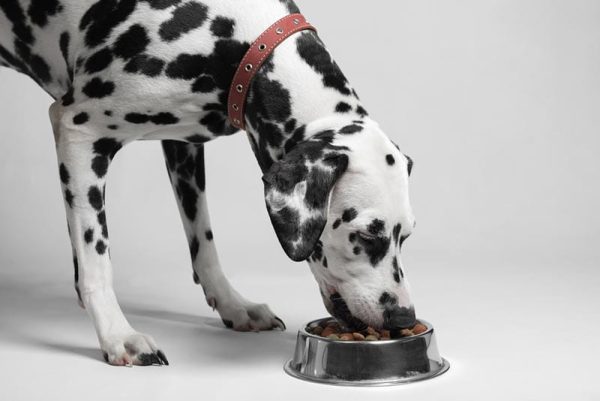Bull Terriers are energetic and charismatic dogs that have a unique charm that captivates dog lovers worldwide. Whether you’re a proud Bull Terrier owner or simply curious about this breed, get ready to be amazed by some intriguing facts that you probably didn’t know. From their historical origins to their distinctive physical features, we’ll explore the many reasons why Bull Terriers are truly one-of-a-kind. Discover their surprising talents, their playful nature, and the remarkable impact they’ve had on popular culture in this article.

The 9 Bull Terrier Facts
1. They Have an Interesting Origin
Bull Terriers have a rich and fascinating history that dates back to 19th century England. Originally bred for dog fighting, they were a result of crossing bulldogs with various terrier breeds. The breed’s creator, James Hinks, aimed to develop a dog with a distinctive appearance and a courageous spirit. Over time, they transitioned from their fighting origins to become beloved companions and show dogs.
During the early years of their development, Hinks actually selectively bred dogs for their unique egg-shaped head and triangular eyes. This distinct head shape soon became a defining characteristic of the breed. Today, Bull Terriers can be found in two varieties–the standard Bull Terrier and the Miniature Bull Terrier. Both share the same sort of feisty personality and playful nature, but the Miniature Bull Terrier is a bit smaller in size.
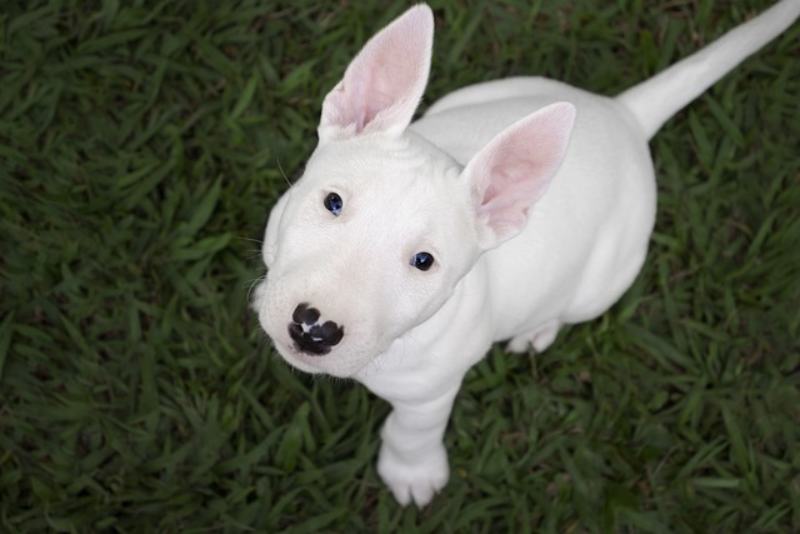
2. They Have a Distinctive Muzzle
One of the most striking features of Bull Terriers is their distinctive head shape. Their egg-shaped heads are broad and muscular, with a well-defined stop and a strong jaw. Their triangular eyes, often referred to as “piggy eyes,” are small and deeply set (and fairly wide set), giving them a mischievous and alert expression. Their ears are naturally erect and can be straight or slightly bent forward.
Bull Terriers have a muscular and athletic build. Their bodies are well-balanced, and their chests are broad and deep. They have a short, dense coat that comes in a variety of colors, including white, brindle, black, and fawn. Their coat is easy to maintain, requiring only regular brushing to keep it looking neat and healthy.
3. They’re Known for Being High Energy Dogs
Bull Terriers are known for their playful and mischievous nature. They have an abundance of energy and love to engage in physical activities. Despite their small size, they’re incredibly strong (like most bulldogs) and can be quite stubborn at times. However, with proper training and socialization, they can become well-behaved and affectionate family pets.
These dogs are highly intelligent, and they’ll require mental stimulation to prevent boredom. They thrive on human companionship and are known for their loyalty and devotion to their families. Bull Terriers are also great with children, although their exuberance and energy levels may require supervision during playtime. With their outgoing and friendly personalities (and proper training/socialization), they can get along well with other dogs and even cats if introduced properly.
4. They’ve Earned a Spot in Pop Culture
These medium-size dogs have also made their mark in popular culture, appearing in movies, TV shows, and books. One of the most famous Bull Terriers is Spuds MacKenzie, the iconic party animal and mascot of Bud Light beer. Spuds MacKenzie became a cultural phenomenon in the 1980s and 1990s, showcasing the fun-loving and playful nature of Bull Terriers.
They’ve also been featured in various books, often portrayed as loyal and courageous companions. Some notable examples include “The Incredible Journey” by Sheila Burnford, which follows the adventures of a Bull Terrier named Bodger, and “Buster: The Dog Who Saved a Thousand Lives”, which is a rather a heartwarming true story about a Bull Terrier that became a search and rescue dog.
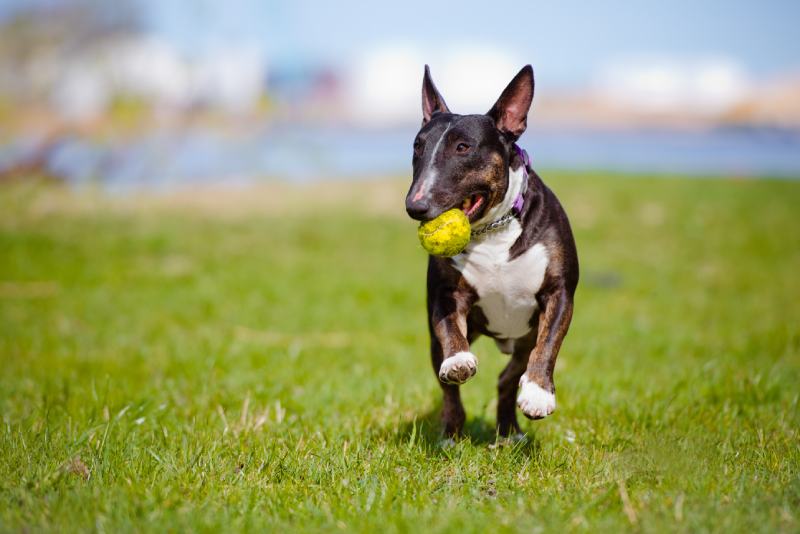
5. They’re Prone to Deafness
One of the most common concerns is hereditary deafness, which affects a significant number of white Bull Terriers. This is a genetic condition that affects a significant number of individuals within the breed. While not all Bull Terriers will develop deafness, it’s important for breeders and owners to be aware of this potential health issue. Deafness in these dogs can occur in one or both ears and can range from partial to complete hearing loss.
The condition is thought to be caused by a combination of genetic factors, including a specific gene mutation that is more common in Bull Terriers. This genetic predisposition means that deafness can be passed down from parents to offspring, making it crucial for breeders to carefully select mating pairs to reduce the risk of producing deaf puppies. The deafness that affects Bull Terriers can have a significant impact on their quality of life. Dogs that are completely deaf may have difficulty responding to verbal commands and may be more prone to accidents or getting lost.
Seek veterinary advice if you’re concerned about your dog being deaf.
If you need to speak with a vet but can't get to one, head over to PangoVet. It's our online service where you can talk to a vet online and get the advice you need for your dog — all at an affordable price!
6. Bull Terriers Are Often Misunderstood
Despite their lovable nature, Bull Terriers have often been misunderstood and labeled as aggressive or dangerous dogs. This misconception stems from their historical association with dog fighting, which has unfairly tarnished their reputation. In reality, they can be friendly, affectionate, and highly trainable when raised in a loving and caring environment.
But it’s important to remember that individual temperament and behavior can vary among dogs, regardless of breed. Proper socialization, training, and responsible ownership play a crucial role in shaping a dog’s personality and behavior. By providing a Bull Terrier with a loving and nurturing home, you can help dispel the myths surrounding this wonderful breed.
7. They Eat Almost as Much as Humans
On average, an adult Bull Terrier weighs around 50–60 pounds and needs approximately 900–1,200 calories per day. This is due to their high level of physical activity. But when it comes to determining the daily calorie needs of a Bull Terrier, several factors need to be taken into consideration. These include the dog’s age, weight, activity level, and overall health. For example, puppies and younger dogs may require more calories to support their growth and development, while older dogs with lower activity levels may need fewer calories to maintain a healthy weight.
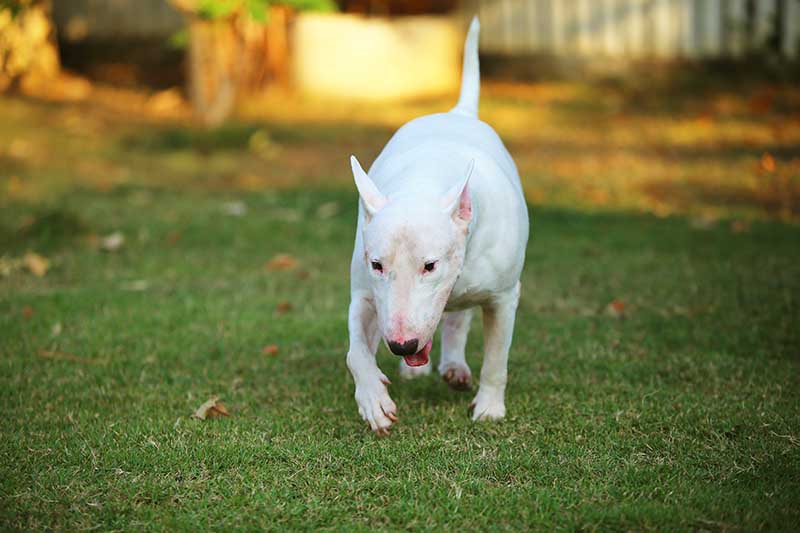
8. They’re Awesome Swimmers
Despite their muscular build and stocky physique, Bull Terriers are actually excellent swimmers. Contrary to popular belief, their unique body shape does not hinder their ability to swim. In fact, their strong legs and broad chest make them powerful swimmers. Their short coat also helps to reduce drag in the water, allowing them to move efficiently. Additionally, these medium-sized Terriers have a natural affinity for water and are known to enjoy swimming. This breed’s love for water can be traced back to their ancestors, who were originally bred as working dogs to help fishermen retrieve nets and tackle from the water. But remember each dog is different. And while some individual Bull Terriers enjoy swimming, some may not enjoy it so much.
9. Their Bite Force Is Beyond Strong
Bull Terriers are known for having a bite force of at least 230 PSI, due to their Pit Bull heritage. This breed has a strong build and muscular jaw structure, which enables them to exert a great amount of force when biting down. Bull Terriers were originally bred for bull-baiting, a sport that required them to immobilize and hold onto large, aggressive animals.
This history of selective breeding for strength and tenacity has likely contributed to the Bull Terrier’s strong bite. Note that bite strength can vary among individual dogs within the breed, as factors such as size, health, and training can influence bite force. It’s always essential for owners to provide proper training and socialization to their Bull Terriers to ensure they have good bite inhibition and are not prone to aggression.

FAQ About Bull Terriers
Are Bull Terriers prone to atopy issues?
Bull Terriers are a breed of dog that is known to be prone to atopy. Atopy is a type of allergic skin disease that can cause itching, redness, and inflammation. It’s believed to be caused by a combination of genetic and environmental factors. Bull Terriers have a higher risk of developing atopy compared to other breeds, which may be due to their genetic predisposition. This breed is known for having sensitive skin, which can make them more susceptible to developing allergies. Additionally, Bull Terriers are often exposed to various environmental triggers such as pollen, dust mites, and certain foods, which can actually exacerbate their atopic condition even more.
Do Bull Terriers get along with cats?
Bull Terriers are known for their strong and energetic nature, which can sometimes make it challenging for them to get along with other animals, including cats. However, whether a Bull Terrier can get along with a cat largely depends on their individual personality and early socialization experiences. Some Bull Terriers may naturally have a higher prey drive, which can make them more prone to chasing or even potentially harming cats–so be sure to watch for this. On the other hand, there are cases where Bull Terriers have formed strong bonds with cats and coexist peacefully. The best thing to do is a slow, watchful, and limited interaction until the pets get used to each other. But until this happens, it may be better to ensure that they have their own spaces in the home–especially if the Terrier isn’t a pup.
Why does my Bull Terrier like playing tug of war?
Bull Terriers are known for their strong and determined nature, which makes them highly enthusiastic about playing tug of war. This breed was originally bred for hunting and later became popular in dog fighting. Due to their history, Bull Terriers have a natural instinct to grab and hold onto things, which is why they enjoy playing this game–many canines are like this, but Pit Bulls are bred for this specifically. By engaging in tug of war, they are able to channel their energy and fulfill their natural desire to bite and hold onto objects.
Playing tug of war also provides mental and physical stimulation for Bull Terriers. It allows them to use their intelligence and problem-solving skills to strategize and win the game. This activity actually even helps to keep their minds sharp and prevents boredom, which can lead to destructive behavior. So, the next time your pup wants to pull on a rope with you, have at it.
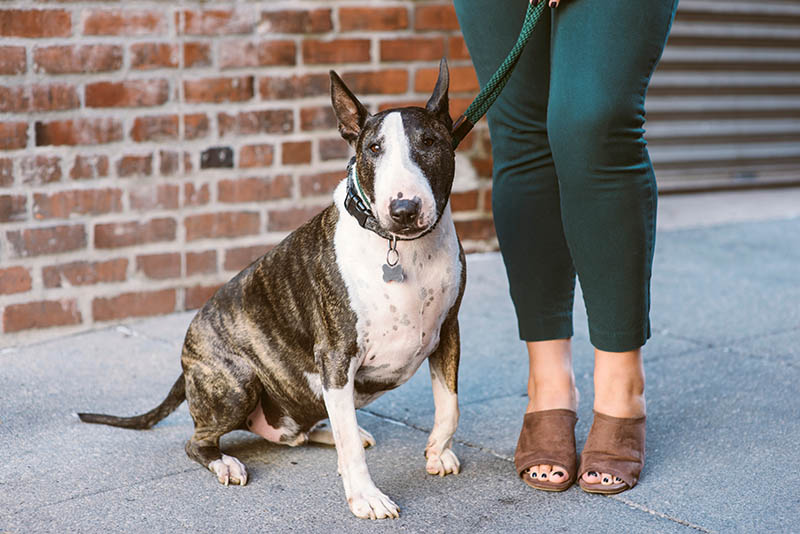
How do I prevent my Bull Terrier from becoming aggressive?
While some Bull Terriers may have a predisposition to aggression due to genetics or past experiences, there are steps that can be taken to minimize the risk. Prevention actually starts with providing proper socialization from a young age. Exposing the Bull Terrier to different environments, people, and animals can help them become more comfortable and less likely to exhibit aggressive behavior. Additionally, consistent and positive reinforcement training is crucial.
Teaching everyday obedience commands such as “sit” and “leave it” can help establish boundaries and reinforce good behavior. It’s also important to ensure that the Bull Terrier receives plenty of exercise and mental stimulation. Regular physical activity can help reduce built-up energy that may contribute to aggressive tendencies. And lastly, seeking the assistance of a professional dog trainer or behaviorist may be beneficial in addressing any aggression issues that may arise during early adulthood.
Can Bull Terriers be sporting dogs?
Yes, one of the defining characteristics of Bull Terriers is their athleticism and energy. They’re a medium-sized breed with a muscular build, which makes them well-suited for various sporting activities. Their strong legs and agile bodies enable them to excel in activities such as agility courses, flyball, and even dock diving. Their natural athleticism combined with their high energy levels make them a perfect fit for these types of sports. Also, Bull Terriers are known for their intelligence and eagerness to please their owners. This makes them highly trainable and adaptable to different sporting disciplines. With consistent and effective training methods, they can learn complex commands and excel in activities that require focus, obedience, and precision.
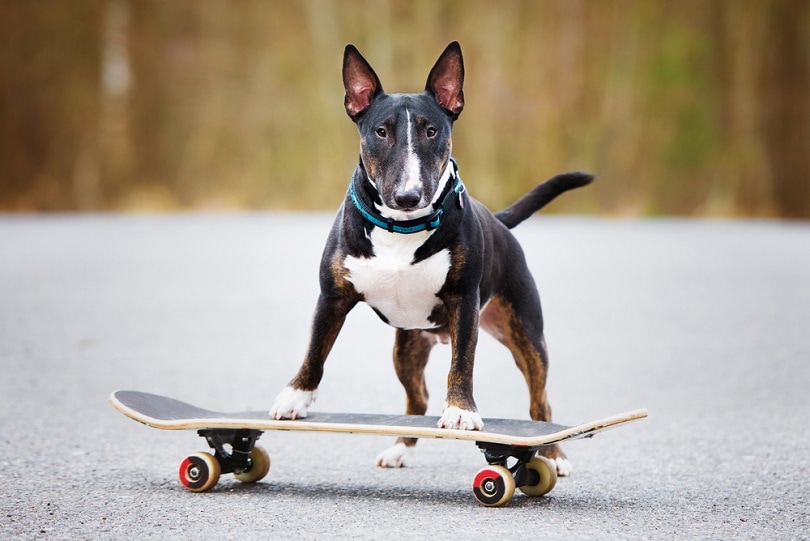
Do Bull Terriers make good support dogs?
They actually can. Bull Terriers have gained a bit of a reputation as strong and fearless dogs (due to their Pit Bull lineage), but they also possess qualities that make them excellent support dogs. These dogs are known for their loyalty, intelligence, and affectionate nature, which are all important traits for a support dog, mind you. Their loyalty means that they are devoted to their owners and will go above and beyond to provide support and comfort. Their intelligence allows them to quickly learn and understand tasks or commands that are necessary for supporting their owners. Additionally, their affectionate nature means that they thrive on human companionship and are always eager to provide comfort and emotional support.

Wrapping Things Up
Bull Terriers are truly unique and fascinating dogs. Their historical origins, distinctive physical features, and playful personalities make them stand out from the crowd. Despite their mischievous nature, they’re super loyal, affectionate, and great with families, including children.
If you’re considering adding a Bull Terrier to your family, be prepared for an energetic and entertaining companion that will keep you on your toes. With proper training, socialization, and care, these dogs can bring endless joy and laughter to your home life.
Featured Image Credit: dudonyrud, Shutterstock
